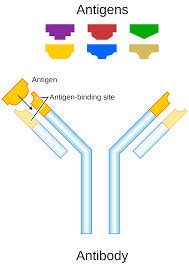记忆方法
将“antibody”分解为两个部分来记忆:“anti-”代表“反对”或“对抗”,“body”代表“身体”。想象身体的防御系统对抗(anti)外来入侵者(body),这样可以帮助记忆“antibody”这个单词,它的意思是抗体,是身体产生的用以抵抗病原体的蛋白质。
以上内容由AI生成, 仅供参考和借鉴
英语词源
- antibody (n.)
- "substance developed in blood as an antitoxin," 1901, a hybrid formed from anti- "against" + body. Probably a translation of German Antikörper, condensed from a phrase such as anti-toxischer Körper "anti-toxic body" (1891).
权威例句
- 1. Objective : To investigate the clinical significance of the Ryanodine receptor antibody ( RyR - Ab ) and interferon - α antibody ( IFN - α Ab ) in myasthenia gravis ( MG ) patients.
- 目的: 探讨检测重症肌无力 ( myastheniagravis,MG ) 患者血清Ryanodine受体抗体 ( Ryanodinereceptor antibody,RyR-Ab ) 和干扰素 - α抗体 ( interferon- αantibody, IFN - αAb ) 的临床意义.
- 2. Scientists call this claw shape the antibody molecule's idiotype.
- 科学家称这种爪型为抗体微小颗粒的遗传型.
- 3. If the antibody reacted, the blood was tainted and should be discarded.
- 如抗体发生反应, 则说明血液已被感染,便不能使用.
- 4. It marshals the same antibody response to both of them.
- 它对两者作出的抗体反应都是一样的.
- 5. Until recently, scientists were unable to make full use of antibody power.
- 直到目前, 科学家们还不能充分利用抗体的力量.
